De Engelse dichter en schrijver William Shakespeare werd geboren in Stradford-upon-Avon op, vermoedelijk, 23 april 1564. Zie ook alle tags voor William Shakespeare op dit blog.
Uit: Othello
“ACT I
SCENE I. Venice. A street.
Enter RODERIGO and IAGO
RODERIGO
Tush! never tell me; I take it much unkindly
That thou, Iago, who hast had my purse
As if the strings were thine, shouldst know of this.
IAGO
‘Sblood, but you will not hear me:
If ever I did dream of such a matter, Abhor me.
RODERIGO
Thou told’st me thou didst hold him in thy hate.
IAGO
Despise me, if I do not. Three great ones of the city,
In personal suit to make me his lieutenant,
Off-capp’d to him: and, by the faith of man,
I know my price, I am worth no worse a place:
But he; as loving his own pride and purposes,
Evades them, with a bombast circumstance
Horribly stuff’d with epithets of war;
And, in conclusion,
Nonsuits my mediators; for, ‘Certes,’ says he,
‘I have already chose my officer.’
And what was he?
Forsooth, a great arithmetician,
One Michael Cassio, a Florentine,
A fellow almost damn’d in a fair wife;
That never set a squadron in the field,
Nor the division of a battle knows
More than a spinster; unless the bookish theoric,
Wherein the toged consuls can propose
As masterly as he: mere prattle, without practise,
Is all his soldiership. But he, sir, had the election:
And I, of whom his eyes had seen the proof
At Rhodes, at Cyprus and on other grounds
Christian and heathen, must be be-lee’d and calm’d
By debitor and creditor: this counter-caster,
He, in good time, must his lieutenant be,
And I–God bless the mark!–his Moorship’s ancient.
RODERIGO
By heaven, I rather would have been his hangman.”
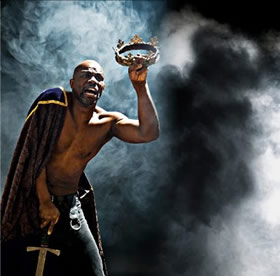
William Shakespeare (23 april 1564 – 23 april 1616)
John Douglas Thompson als Othello (Shakespeare& Company, Lenox, Massachusetts, 2009)
De Oekraïense schrijver Andrey Kurkov werd geboren op 23 april 1961 in Leningrad. Zie ook alle tags voor Andrey Kurkov op dit blog.
Uit: Death and the Penguin (Vertaald door George Bird)
“First, a stone landed a metre from Viktor’s foot. He glanced back. Two louts stood grinning, one of whom stooped, picked up another from a section of broken cobble, and bowled it at him, skittler-fashion. Viktor made off at something approaching a racing walk and rounded the corner, telling himself the main thing was not to run. He paused outside his block, glancing up at the hanging clock: 9.00. Not a sound. No one about. He went in, now no longer afraid. They found life dull, ordinary people, now that entertainment was beyond their means. So they bowled cobbles.
As he turned on the kitchen light, it went off again. They had cut the power, just like that. And in the darkness he became aware of the unhurried footfalls of Misha the penguin.
Misha had appeared chez Viktor a year before, when the zoo was giving hungry animals away to anyone able to feed them. Viktor had gone along and returned with a king penguin. Abandoned by his girlfriend the week before, he had been feeling lonely. But Misha had brought his own kind of loneliness, and the result was now two complementary lonelinesses, creating an impression more of interdependence than of amity.
Unearthing a candle, he lit it and stood it on the table in any empty mayonnaise pot. The poetic insouciance of the tiny light sent him to look, in the semi-darkness, for pen and paper. He sat down at the table with the paper between him and the candle; paper asking to be written on. He he been a poet, rhyme would have raced across the white. But he wasn’t. He was trapped in a rut between journalism and meagre scraps of prose. Short stories were the best he could do. Very short, too short to make a living from, even if he got paid for them.
A shot rang out.
Darting to the window, Viktor pressed his face to the glass. Nothing. He returned to his sheet of paper. Already he had thought up a story around that shot. A single side was all it took; no more, no less. And as his latest short short story drew to its tragic close, the power came back on and the ceiling bulb blazed. Blowing out the candle, he fetched coley from the freezer in Misha’s bowl.”
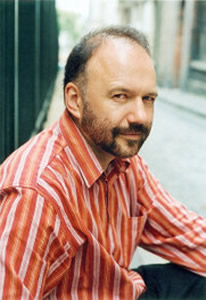
Andrey Kurkov (Leningrad, 23 april 1961)
De Franse schrijver Pascal Quignard werd geboren op 23 april 1948 in Verneuil-sur-Avre. Zie ook alle tags voor Pascal Quignard op dit blog.
Uit: Sur le jadis
“Dans son trou le vieux répondit à son fils :
— C’est l’un des trois secrets du jadis. C’est facile. Il s’agit du secret de la succession des rotations célestes. Tisse une très belle corde. Mets-la sur une pierre plate. Va au palais avec ta pierre et ta corde. Demande au seigneur qu’il te donne du feu de son âtre. Brûle-la sous ses yeux.
Le fils fit comme son père avait dit. Le seigneur fut étonné mais il offrit en récompense au fils une corde neuve avec au bout un bœuf.
Le fils les ramena chez lui. Il alla trouver son père. Il lui exprima sa gratitude. Il lui dit :
— Que veut dire la corde de cendres ?
— Que jadis nous incinérions nos guerriers en les couchant sous des pierres quand ils étaient morts au cours du combat qu’ils avaient mené pour défendre le village.
*
Un an passa.
Au début de l’année qui suivit le roi du pays fit venir Corde de Cendres. Il lui montra au milieu de la grand-salle un tronc d’arbre qui avait été coupé, qui était tout noir, le fût parfaitement rond, l’ensemble entièrement poli. Le seigneur se tourna vers Corde de Cendres et lui dit :
— Demain matin tu me diras de quel côté se trouve la racine de cet arbre ou tu mourras.
Le fils pieux fut rempli de perplexité. Il regarda longtemps et silencieusement le fût noir et lisse qui brillait au milieu de la salle du palais. Il rentra dans sa cabane. Quand la nuit fut tombée il alla trouver son père dans le champ de derrière, derrière son buisson de ronces.”
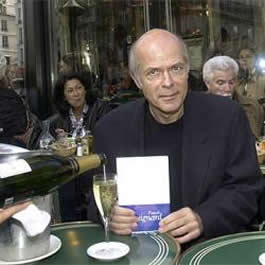
Pascal Quignard (Verneuil-sur-Avre, 23 april 1948)
De Duitse dichter, essayist en literatuurwetenschapper Peter Horst Neumann werd geboren op 23 april 1936 in Neisse. Zie ook alle tags voor Peter Horst Neumann op dit blog.
Als sie nach einer Sommerreise ihren Garten wiedersah
Die unter Wunden
aufgesteckte Brombeerhecke
wuchs über sich hinaus,
mit Stachelschlangen
sind die Wege überschossen,
dein Fleiß vergessen,
deine Ordnung überlebt.
Verbrüdert wuchert Kresse
zwischen Bohnen, die Zwiebeln
haben sich mit Wicken
überworfen, der kleine Kürbis
stieg den Baum hinaus,
läßt sein Kugeln bei den Äpfeln
leuchten.
Sich zu verwüsten –
Lust der Gärten. Wenn
du dich freuen könntest,
Gärtnerin. Die Bombe
vom Tomatenstrauch
fällt weich.
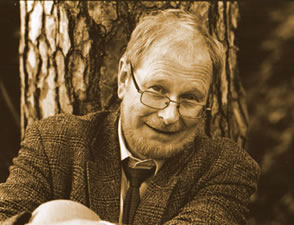
Peter Horst Neumann (23 april 1936 – 27 juli 2009)
De Oostenrijkse dichteres Christine Busta werd geboren op 23 april 1915 in Wenen. Zie ook alle tags voor Christine Busta op dit blog.
Am Rande
Manchmal auf einer Schwelle sitzen,
ausruhn vom Gehn, das nicht ankommt,
die Türe hinter dir und nicht klopfen.
Alle Geräusche wahrnehmen
und keines verursachen.
Das Leben, das dich nicht annimmt, erhören:
im Haus, auf der Straße,
das Herz der Maus und des Motors,
die Stimmen von Luft und Wasser,
die Schritte des Menschen, der Sterne,
das Seufzen von Erde und Stein.
Manchmal setzt sich das Licht zu dir
und manchmal der Schatten,
treue Geschwister.
Staub will nisten auf dir
und unbetretbarer Schnee.
Langsam unter der Zunge
wärmt sich dein letztes Wort.
Die Wand
Du warst die Wand, an die ich mich lehnte,
und die Wand, an der ich mich stieß.
Dann begannst du zurückzuweichen.
Jetzt bist du unerreichbar geworden.
Aber ich weiß, zuletzt
wirst du die Wand sein, die auf mich zukommt,
und ich werde durch dich hindurchgehn,
ohne dass wir einander verletzen.
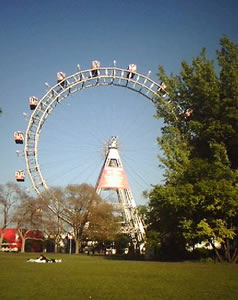
Christine Busta (23 april 1915 – 3 december 1987)
Wenen, Prater
Zie voor nog meer schrijvers van de 23e april ook mijn blog van 23 april 2012 deel 1 en ook deel 2.
